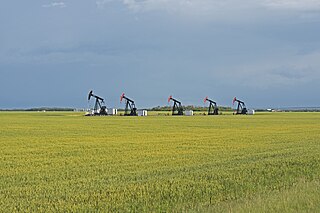 W
WBitumount is an abandoned industrial site on the east bank of the Athabasca River about 90 kilometres (60 mi) north of Fort McMurray in northeastern Alberta, Canada. Between 1925 and the 1950s, it was the site of early attempts to extract bitumen from the Athabasca oil sands that contributed to the development of commercially viable extraction processes. The site closed permanently in 1958. Some of the structures at Bitumont were declared Provincial Historic Resources in 1974. As of 2017, the buildings are deteriorating.
 W
WThe Cold Lake oil sands are a large deposit of oil sands located near Cold Lake, Alberta. Cold Lake is east of Alberta's capital, Edmonton, near Alberta's border with Saskatchewan, and a small portion of the Cold Lake field lies in Saskatchewan.
 W
WHorizon Oil Sands is an oil sands mining and upgrading project in Bitumount, Alberta, Canada. The project includes a surface oil sands mining and bitumen extraction plant, complemented by on-site bitumen upgrading with associated infrastructure.
 W
WThe Kearl Oil Sands Project is an oil sands mine in the Athabasca Oil Sands region at the Kearl Lake area, about 70 kilometres (43 mi) north of Fort McMurray in Alberta, Canada. The project is being developed in three phases with the first phase completed mid-2013.
 W
WThe Melville Island oil sands are a large deposit of oil sands on Melville Island in the Canadian Arctic Archipelago.
 W
WOil reserves in Canada were estimated at 172 billion barrels as of the start of 2015 . This figure includes the oil sands reserves that are estimated by government regulators to be economically producible at current prices using current technology. According to this figure, Canada's reserves are third only to Venezuela and Saudi Arabia. Over 95% of these reserves are in the oil sands deposits in the province of Alberta. Alberta contains nearly all of Canada's oil sands and much of its conventional oil reserves. The balance is concentrated in several other provinces and territories. Saskatchewan and offshore areas of Newfoundland in particular have substantial oil production and reserves. Alberta has 39% of Canada's remaining conventional oil reserves, offshore Newfoundland 28% and Saskatchewan 27%, but if oil sands are included, Alberta's share is over 98%.
 W
WLocated in northwest-central Alberta, the Peace River oil sands deposit is the smallest of four large deposits of oil sands of the Western Canadian Sedimentary Basin formation.
 W
WSuncor Energy is a Canadian integrated energy company based in Calgary, Alberta. It specializes in production of synthetic crude from oil sands. In the 2020 Forbes Global 2000, Suncor Energy was ranked as the 252nd -largest public company in the world.
 W
WThe Tar Sands Healing Walk, a 14km prayer walk through the heart of the tar sands extraction zone, began in 2010 taking place just north of the city of Fort McMurray, Alberta at a location known as the Syncrude Loop. This walk was led by local Elders who prayed for the healing of the land and "to bring attention to the destructive impacts of the tar sands." The Tar Sands Healing Walk was founded by a coalition of Indigenous women from First Nations communities impacted by Tar Sands projects, and included Cleo Reece and Violet Clarke, Eriel Tchekwie Deranger and Melina Laboucan-Massimo. The Tar Sands Healing first was supported by environmental organizations Sierra Club Prairie Chapter, Greenpeace and Keepers of the Athabasca. The inaugural gatherings was organized by local communities and supported by allies. The following years, Keepers of the Athabasca, a collective of First Nations, Metis, Inuit, environmental groups, and watershed citizens, became a core supporter.Jesse Cardinal of the Kikino Metis Settlement was hired to support the main founders and organizer to coordinate the annual event, which ultimately expanded to include an educational and spiritual camp before and after, including conference and ceremony. Over five consecutive years the Tar Sands Healing Walk brought together hundreds of people to walk in a spiritual gathering to protect culture, environment and climate from the expansion of the tar sands. This women's initiative aimed to unite the peoples of the Athabasca River and Lake Watershed to secure and protect water and watershed lands for ecological, social, cultural and community health and well being.
 W
WWabasca is an oil field in a remote area of northern Alberta, Canada. It is the fourth largest deposit of oil sands located in Alberta, located southwest of the larger Athabasca oil sands deposit. It is also known as the Pelican Lake Oilfield.